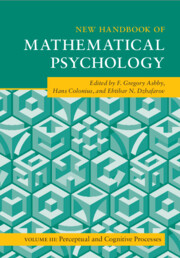Book contents
- Frontmatter
- Contents
- Contributors
- Preface
- 1 Principles and Consequences of the Initial Visual Encoding
- 2 Measuring Multisensory Integration in Selected Paradigms
- 3 Fechnerian Scaling: Dissimilarity Cumulation Theory
- 4 Mathematical Models of Human Learning
- 5 Formal Models of Memory Based on Temporally-Varying Representations
- 6 Statistical Decision Theory
- 7 Modeling Response Inhibition in the Stop-Signal Task
- 8 Approximate Bayesian Computation
- 9 Cognitive Diagnosis Models
- 10 Encoding Models in Neuroimaging
- Index
3 - Fechnerian Scaling: Dissimilarity Cumulation Theory
Published online by Cambridge University Press: 20 April 2023
- Frontmatter
- Contents
- Contributors
- Preface
- 1 Principles and Consequences of the Initial Visual Encoding
- 2 Measuring Multisensory Integration in Selected Paradigms
- 3 Fechnerian Scaling: Dissimilarity Cumulation Theory
- 4 Mathematical Models of Human Learning
- 5 Formal Models of Memory Based on Temporally-Varying Representations
- 6 Statistical Decision Theory
- 7 Modeling Response Inhibition in the Stop-Signal Task
- 8 Approximate Bayesian Computation
- 9 Cognitive Diagnosis Models
- 10 Encoding Models in Neuroimaging
- Index
Summary
This chapter presents a systematic theory of generalized (or universal) Fechnerian scaling, based on the intuition underlying Fechner’s original theory. The intuition is that subjective distances among stimuli are computed by cumulating small discriminability values between “neighboring” stimuli. A stimulus space is supposed to be endowed by a dissimilarity function, computed from a discrimination probability function for any pair of stimuli chosen in two distinct observation areas. On the most abstract level, one considers all possible chains of stimuli leading from stimulus a to stimulus b and back to a, and takes the infimum of the sums of the dissimilarities along these chains as the subjective distance between a and b. In arc-connected spaces, the cumulation of dissimilarity values along all possible chains reduces to their cumulation along continuous paths, leading to a fully fledged metric geometry. In topologically Euclidean spaces, the cumulation along paths further reduces to integration along smooth paths, and the geometry in question acquires the form of a generalized Finsler geometry. The chapter also discusses Fechner’s original derivation of his logarithmic law, observation sorites paradox, a generalized Floyd--Warshall algorithm for computing metric distances from dissimilarities, and an ultra-metric version and data-analytic application of Fechnerian scaling.
Keywords
- Type
- Chapter
- Information
- New Handbook of Mathematical Psychology , pp. 80 - 162Publisher: Cambridge University PressPrint publication year: 2023

